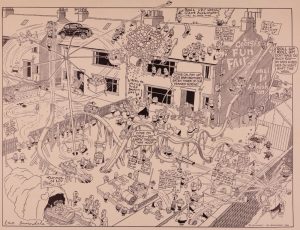The theory of Eternalism was first posited by the metaphysician J.M.E.McTaggart. As I would assume with metaphysics in general, it’s rather a dense notion to get one’s head around[1]. It suggests that the past, present and future are all equally ‘real’ – that events are not only happening now, but both have been and will be simultaneously as well.
At least I think that’s the crux of it.
I bring this up because it chimes with my experience of working in Archives and Special Collections. Since starting I’ve handled, sorted, lifted, counted and been left covered in dust by a host of materials. Each in their own way has fascinated me. Take, for instance, the Scottish Anti-Apartheid Movement (written about so eloquently in previous blogs by Julia Wylie). Here was a cause I knew about in the abstract, after it had been folded neatly into history and its narrative through line clearly established. It was only when sorting through the records, chronologically ordering the papers, sifting through minutes of meeting after meeting, flyer upon flyer, letters back and forth, that I gleaned some semblance of feeling what it must have been like at the time, when the history had not yet been written and the outcome not yet defined. From hastily scribbled tea stained notes to correspondence with cabinet ministers, the archive is a monument to the work done by so many women and men. Moving from year to year, their urgency and dedication is apparent and alive. You are with these people; you see their struggles and disagreements, their consolations and victories. The past becomes their present and from the vantage point of the future you are at one with it.
A few months ago I was sorting through the papers of Sandy Hobbs – including boxes of comic books from the 60s and 70s. Along with the perennial Beanos and Dandys there were a host of others with which I was unfamiliar. A couple of days later I was speaking to my dad, telling him what I had been doing at work. Without prompting he started reeling off comic title after title, telling me which ones he would get and how they were delineated between him and his brother. I thought about working in the Archive Centre Reading Room, every inch of every table covered in these comics. They were part of my dad’s youth and of countless other boys and girls. They exist in each of their memories, and now, neatly organised, they have a place in mine.
David Ward – Library Assistant
We at the Archive Centre were saddened to hear of Leo Baxendale’s passing . He kindly granted us permission to create a postcard of one of his Scottish CND drawings in 2006.
His memory will live on here at GCU in our Sandy Hobbs Collection.
Carole McCallum – University Archivist
[1] I really do mean dense. See here for proof: https://plato.stanford.edu/entries/mctaggart/#UnrTim
